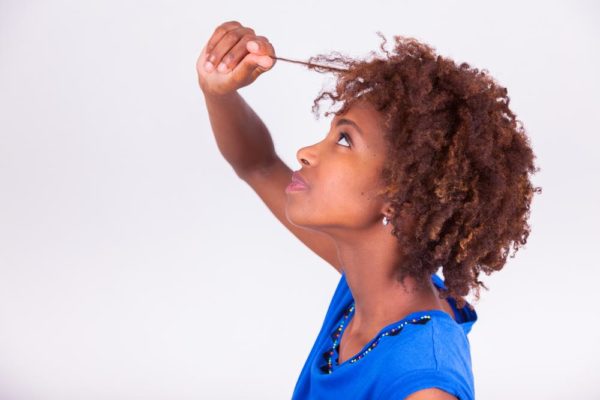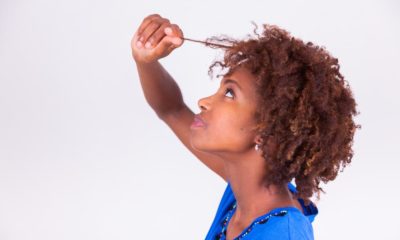Features
Nicole Ezeh: How To Combat Dryness When You Have High Porosity Hair
 Does your hair constantly need moisturizing daily? Is it always thirsty/parched and frizzy no matter how much products you heap on it? You just might have high porosity hair. High porosity is the porosity type where the hair’s cuticles are constantly lifted. It is very challenging for HiPo hair to retain moisture because the hair’s pH which is generally between 4.5-5.5 is very high (alkaline). This alkalinity is what keeps the cuticles lifted all the time making it very easy for HiPo hair to be moisturised but also extremely easy to dry out.
Does your hair constantly need moisturizing daily? Is it always thirsty/parched and frizzy no matter how much products you heap on it? You just might have high porosity hair. High porosity is the porosity type where the hair’s cuticles are constantly lifted. It is very challenging for HiPo hair to retain moisture because the hair’s pH which is generally between 4.5-5.5 is very high (alkaline). This alkalinity is what keeps the cuticles lifted all the time making it very easy for HiPo hair to be moisturised but also extremely easy to dry out.
High Porosity hair’s greatest challenge is keeping moisture in and in order to do this, the hair’s pH must be lowered so that the cuticles can contract. In summary, all I’m saying is: Acidic state causes the cuticles to contract while Alkaline state causes the cuticles to open/lift. High porosity hair is often referred to as damaged hair but that may not necessarily be true because there are naturals who don’t use heat, dyes or detangle/handle their hair roughly and still have HiPo hair. It may be genetic.
There are products/procedures used to lower HiPo hair’s cuticles and keep moisture in for a longer period of time:
Apple Cider Vinegar
A staple for almost every natural, this acts as a gentle cleanser, pH regulator and generally promotes a healthy scalp because fungi and bacteria die off in an acidic environment which is why it is used for treating dandruff and other scalp infections. ACV with the ‘mother’ has a pH of 2.8 – 3.0, it is very acidic and is perfect for lowering HiPo hair cuticles. Mix a 50:50 ratio of ACV and water together and use as a last rinse after washing. Cover with a plastic cap for 15-20 minutes, blot out the excess water with a cotton tee, then moisturize. Do not rinse out. The colder the water and ACV are, the better.
Aloe Vera
It does not matter whether it is the juice or gel, this medicinal miracle plant lowers the hair’s pH. The gel also contains a compound similar to keratin which strengthens the hair cuticles making them lie a little flatter and able to retain moisture for a longer period of time. This is one of the reasons it dries out Low porosity hair.
Logically speaking, low porosity hair’s cuticles are already flat and compact which makes the application of aloe vera leave the hair hard because the keratin is too bulky to penetrate the cuticles and/or strengthen the hair strands leaving the keratin on the surface where it dries out the hair because a drug cannot work for a healthy person. Instead, it creates new problems. This is a case of strength meeting strength making you end up with brittle hair. I hope this explanation made sense. I was just trying to explain it better for girls like me who read the praises given to aloe vera but eventually find out it is the worst thing for our hair.
After washing with warm water and rinsing with cold water, put some ice-cold aloe juice in a spray bottle and spritz it as a leave-in to shock the cuticles closed a little bit more. Aloe vera has a pH value of 6 (slightly acidic) and this is also another reason why it dries out most Low porosity hair which is already dry due to its acidic state.
Alternatively, aloe gel can also be added to your leave-in and refrigerated and used for the LOC method. You can be a little extra and do the LAOC method. The ‘A’ stands for the aloe vera gel. If you are a low-maintenance natural like me, make a shea-aloe mixture as your cream-based moisturizer. Simply add shea butter, aloe gel, your favourite/all your oils and whip. Don’t melt the butter. Whip as it is. Store in the refrigerator but do not allow to freeze.
Tips For Maintaining High Porosity Hair
This should be what your regimen should entail as a HiPo girl:
– Prepoo and Detangle on dry hair because HiPo hair is extremely fragile when wet. Dry in this context, means damp hair.
– Steer clear of sulfate shampoos. Moisturizing shampoos does the job for high porosity hair. Co-washing is mostly ideal for high porosity hair and silicone-based conditioners are perfect because they clog the cuticles preventing moisture from escaping. Cleansing once a month and co-washing once or twice a week is okay to avoid product build-up.
– Wash with warm water and do your last rinse with cold water to shock the cuticles closed.
– Deep condition on a weekly basis to feed moisture to your hair.
– Do heavy protein treatments once a month to strengthen the cuticles and help them lie a little flatter. Listen to your hair and know how often it needs these treatments. Once a month is ideal. You may need it twice a month though. If you don’t know how to find out when you need protein treatments, check how much your hair breaks, check if it is feeling limp/weak and too soft when dry and all ‘mushy’ and ‘squishy’ when wet. Follow protein treatments up with a moisturising deep conditioner to avoid brittle hair.
– Use a cotton t-shirt to blot out excess water from your hair. Towels cause friction thereby agitating the hair cuticles and leading to cuticle damage.
– Always wrap your hair up at night with a satin scarf/bonnet or sleep on a satin/silk pillowcase. A silk scarf is also fine. Sleeping on a cotton pillowcase causes breakage because hair strands tend to get caught in the cotton and break off and cotton strips the hair of moisture leaving it dry and hard. Look at wrapping up your hair at night this way. You save time and money spent moisturising daily with products which should be ideally used twice a week.
– Use heavy products. Olive, avocado and castor oils are ideal and butters should be used in their unrefined state or whipped with aloe gel to make them thicker. Thick and creamy leave-in conditioners/stylers are also advisable. Branded products like Shea Moisture’s curl enhancing smoothie and restorative conditioner are ideal. Apply products by smoothing it in using the prayer hands method to manually lie the cuticles a little flatter. As a bonus, you can use coconut oil before applying any of the heavy oils because coconut oil contains compounds that bind with proteins in the hair strengthening it and decreasing the regularity of protein treatments.
– Avoid blow-dryers and flat-irons as they cause more damage to the cuticles.
This is where we conclude hair porosity. I hope you picked up a few helpful tips. I wish myself and you all a prosperous and stress-free natural hair journey.
See you in the next one. Peace and blessings!
Photo Credit: Sam74100 | Dreamstime.com
























